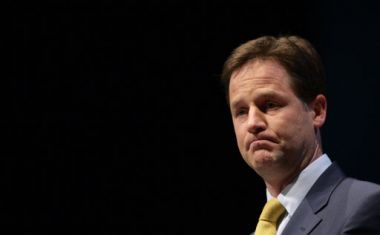David Cameron rejects Nick Clegg's support for separation of church and state

David Cameron has said he disagrees with Nick Clegg in his support for the separation of Church and State, and the disestablishment of the Church of England.
The Prime Minister was quoted in the Independent today as saying: "I think our arrangements work well in this country. We are a Christian country, we have an established church."
Eschewing any notion that his party would support such a move, Mr Cameron said that disestablishment was "a long term Liberal idea but it is not a Conservative one".
The Prime Minister's comments were in response to comments made by the Deputy Prime Minister in an LBC phone in discussion programme yesterday.
Mr Clegg said he felt: "In the long run it would be better for the church and better for people of faith, and better for Anglicans, if the church and the state were over time to stand on their own two separate feet. But that's not going to happen overnight, for sure."
The Church of England's connection to the state first began in 1534 with Henry VIII's split from the Roman Catholic Church, to enable his divorce from Catherine of Aragon. To this day, the ruling monarch still holds the title of "Defender of the Faith".
The Bishop of Rochester, the Right Reverernd James Langstaff, spoke on the BBC's Today Programme to say that the Church of England's establishment was important "because it maintains within our public life a space in which to talk about faith and to take faith seriously".
Executive Director of the Conservative Christian Fellowship, Colin Bloom, told Christian Today that he and his organisation support the status quo.
"We don't want to see the Church of England disestablished. To do so would unravel hundreds of years of our heritage, for no good reason," he said.
Speculating on why some object to an established Church, Mr Bloom said: "Because it works in practice, but not in theory, many people have a problem with it."
Mr Bloom's case for keeping the Church in its current place was quite simple: "If it ain't broke, don't fix it."
Discussion around the place of the Church of England and Christianity more generally in Britain has been enlivened this week by David Cameron's comments in the Church Times about Britain's status as a "Christian country" and his hopes that Christians should be more unabashedly "evangelical" in their faith.
This prompted a response from a group of over 50 prominent secularists, including scientists, novelists, comedians, and historians, who suggested in a letter published in The Telegraph that the Prime Minister was fostering social "alienation" and "sectarian" divisions.
But others have suggested that the Christian heritage of Britain should be welcomed, with a group of eight senior philosophers also publishing a letter in the Telegraph, suggesting that the Church of England's tradition of "Christian humanism" has helped create a tolerance of people of all faiths and none.
The idea of separation of the Church of England has, on rare occasions, come from within the church itself. In 2008, the then Archbishop of Canterbury, Rowan Williams wrote in the New Statesman that in his view: "I can see that it's by no means the end of the world if the establishment disappears."
He said he believed there was "a certain integrity" to not needing parliamentary approval for all the Church's new rules.











